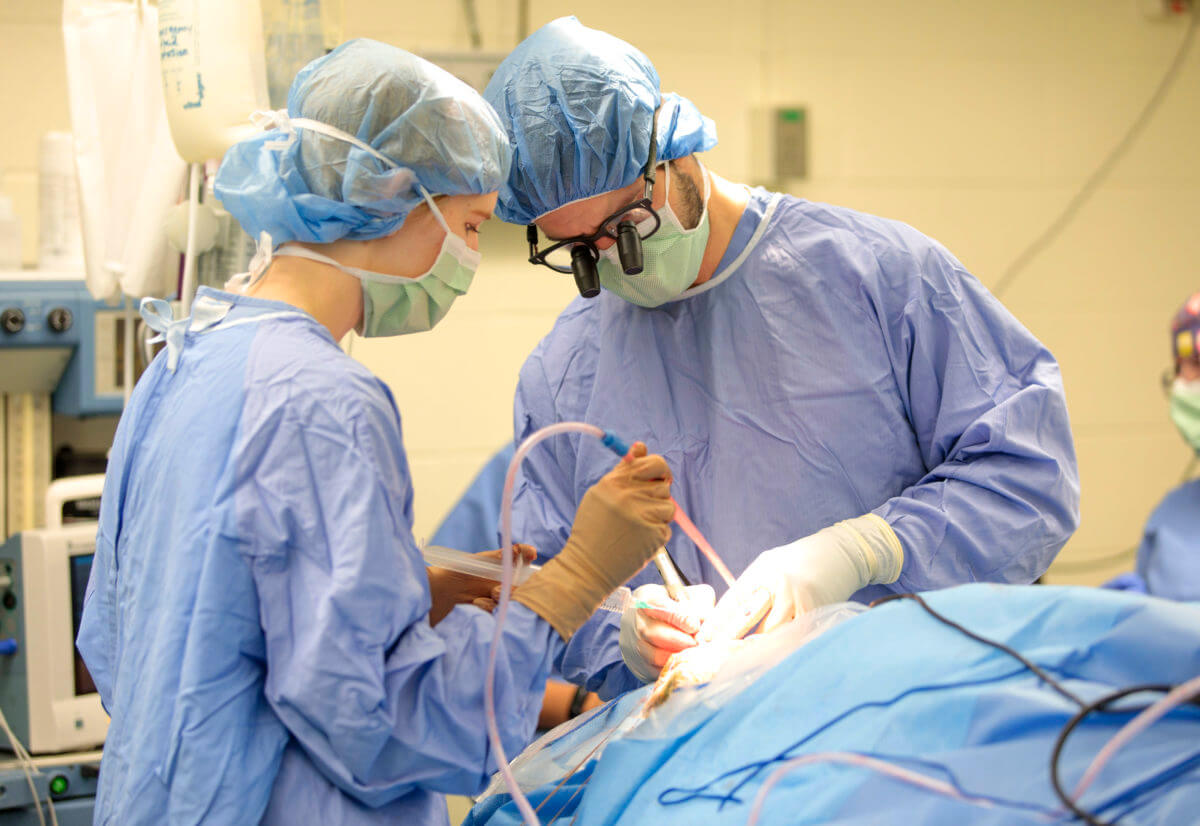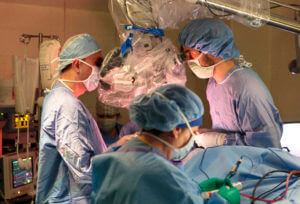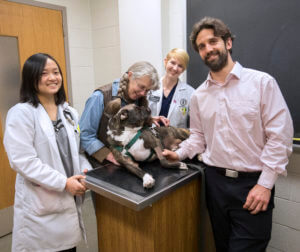
PVM Partnership Advances Search for Cancer Cure
Make a Gift
Support the College

Purdue Veterinary Medicine’s Dr. Timothy Bentley and Dr. Lindsey Peterson, neurology resident, perform brain surgery to remove a glioma tumor, a volatile and deadly type of brain cancer, from a canine patient. The surgery involved veterinary specialists from Purdue and human medicine specialists from IU Health Methodist Hospital. Their partnership joins veterinary and human medicine in the search for a cure for brain cancer. (IU Health photo/Christopher Bergin)
Gliomas are one of the most common brain cancers in dogs, and one of the most difficult-to-treat cancers in any species. A surgical partnership involving specialists at the Purdue University College of Veterinary Medicine and the IU Health Methodist Hospital and Goodman Campbell Brain and Spine is helping veterinarians and doctors work together to better understand how to treat gliomas in patients of all kinds.
“Clyde was sleeping comfortably after his surgery, but when I opened up his cage I could see his tail wagging under the blanket,” Dr. Timothy Bentley, Purdue Veterinary Medicine associate professor of neurology and neurosurgery, recalled with a smile. Clyde, a brindle mixed-breed dog, had been adopted from an Illinois shelter. Not long afterward, his new owner noticed sudden changes in the dog’s personality and behavior. It was December 2017 when the owner brought Clyde to his veterinarian who observed the dog compulsively walking in circles and sometimes unable to sense the location of his back limbs. The veterinarian referred Clyde to doctors at the University of Illinois College of Veterinary Medicine, who diagnosed him with a type of cancer called a glioma, and then referred him to the Veterinary Teaching Hospital at the Purdue University College of Veterinary Medicine.
Gliomas are an aggressive and unpredictable type of brain cancer that originate in the sticky glial cells that surround and support neurons in the brain, often mixing with normal brain tissue. “Traditional cancer treatments don’t work well on glioma because you can’t take too much brain around the margins of the cancer when you operate, and it often pops up on the other side of the brain later,” Dr. Bentley explained. “The blood-brain barrier blocks many chemotherapies that could treat the brain tumor. And creating large surgical margins around the cancer, which helps in conditions such as skin cancer, would lead to unwanted side effects like paralysis and blindness and more, if you used that technique in the brain, due to the trauma on surrounding brain tissue.”

Drs. Bentley and Cohen operate to remove a deadly glioma from Clyde, a dog with brain cancer. Preserving biopsies of the cancer is integral to further diagnosis and research on these tumors, which helps in refining chemotherapy, radiation, and other cancer treatments. (IU Health photo/Christopher Bergin)
Why glioma?
“I like a challenge,” Dr. Bentley said emphatically. “Glioma is this impossibly hard cancer that, in over 40 years of research, no one has found a new drug for. I’m very much a horrendously competitive person who finds things to compete with – like cancer,” he said, chuckling, “…for my own personal outlet.”
Dr. Bentley is widely known for his research on brain tumors in dogs, particularly gliomas, which are very common in some dog breeds and notoriously difficult to treat in any species. Glioma is a “hideously aggressive cancer” in canines and humans alike, said Dr. Bentley, with an almost 100% chance of reoccurrence despite various treatments.
Nurturing a Research Partnership
In 2011, Purdue Veterinary Medicine teamed up with the Indiana University School of Medicine, creating a surgical partnership between the two institutions to facilitate leading-edge glioma treatment and research. Dr. Bentley works with Dr. Aaron Cohen-Gadol, a board-certified neurological surgeon at the IU Health Methodist Hospital and Goodman Campbell Brain and Spine, who commonly removes these tumors and preserves them for testing in a laboratory setting.
Preserving biopsies of the cancer is integral to further diagnosis and research, and it also serves the mission of humanely procuring cancer tissue samples for research by treating canine patients who would otherwise likely go untreated. With permission from patient owners, eligible dogs are transported to a special surgical facility in Indianapolis. There Dr. Bentley is able to open up the canine cranium with a technique he developed, called the “Purdue diamond,” and Dr. Cohen and his team remove the tumor itself with special instruments, carefully extracting the tumor with as little trauma to the surrounding brain tissue as possible. Post-operative MRIs are performed at no cost to the owner of the patient and typically confirm successful removal of the entire tumor.

Clyde is reunited with his Purdue treatment team at the Purdue University Veterinary Teaching Hospital at a post-surgery follow-up appointment. Pictured with his owner, Lisa Braddock (second from left), are members of Clyde’s VTH treatment team (left-right) Dian Dian Lin, of the DVM Class of 2018; Dr. Lindsey Peterson, third-year neurology resident in the Department of Veterinary Clinical Sciences; and Dr. Timothy Bentley, associate professor of neurology and neurosurgery, also in the Department of Veterinary Clinical Sciences.
“Clyde’s tumor was deep in the brain, quite close to critical brain structures, necessitating precision in removing tumor tissue without accidentally damaging any of the healthy brain tissue right next to it,” recalled Dr. Bentley. “Dr. Cohen uses extremely high-powered microscopes that allow him to see the tissue and remove it in tiny layers, millimeter by millimeter. It’s a very delicate surgery.”
Dr. Cohen volunteers his time on this project because he feels it is a good use of his energy and experience, especially since findings from this procedure allow him to better care for his patients, and also because he enjoys working with the dogs. “The dogs know you’re there to help them out, and it’s a very satisfying endeavor as a doctor to be able to be involved in their care,” he said. “As the number of participants grows, we will be able to make more conclusive statements about potential cancer treatments.”
Cancer tissue gleaned from this surgical partnership is used in a laboratory setting to refine chemotherapy, radiation, and other cancer treatments. Because a canine glioma is similar to human gliomas, successful treatments in this setting can be considered and tested for human patients.
At this time there is no cure for this kind of cancer. Because of the volatility of the disease, treatment often means a marked reduction of symptoms, with a huge variation in projected life expectancy. In dogs, various treatments will extend patients’ lifespans anywhere from two months to a year, on average. In humans, treatment will extend life around 14-20 months. Clyde’s owner, Lisa Braddock, says Clyde is doing very well at home after the surgery. Three months after surgery, he came back to Purdue for another MRI where no tumor was visible, confirming that he is in complete remission. There is a good chance that the cancer will eventually return, but Clyde’s surgery allows him an extended quality of life and a chance to leave a legacy of hope through cancer research for dogs, humans, and beyond.
Writer(s): Lauren Bruce | pvmnews@purdue.edu

